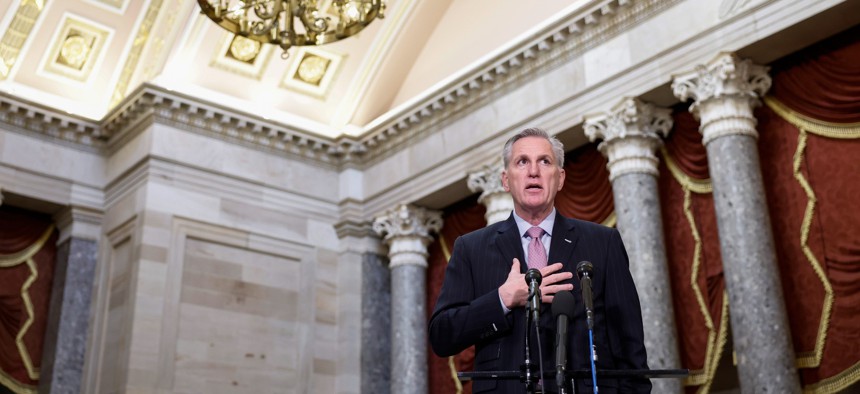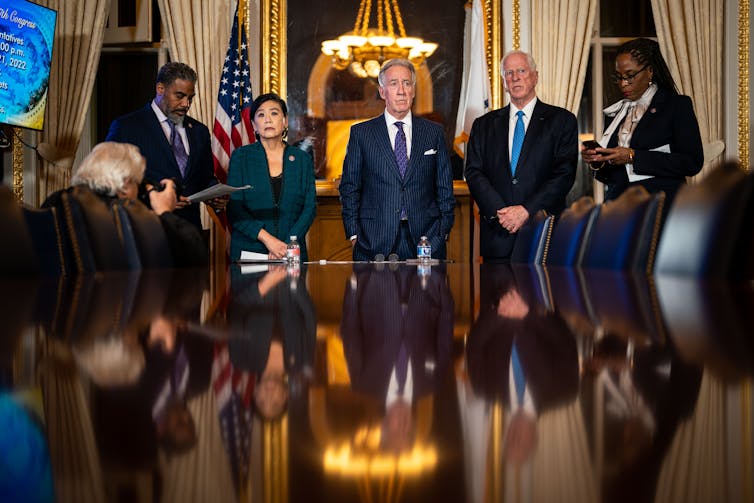
gestures as he speaks at a news conference on Jan. 12 at the Capitol. Anna Moneymaker/Getty Images
Congress Investigates Presidents, the Military, Baseball and Whatever It Wants – a Brief Modern History of Oversight
The House GOP has announced a slew of investigations, including a review of the conduct of the Department of Justice and its investigations of Donald Trump.
After regaining a slim majority in the House of Representatives in the November 2022 midterm elections, Republicans unveiled their plans for a series of investigations into the Biden administration.
The new Republican majority – after four years in the relatively powerless minority – plans to investigate the Biden family’s connections to foreign businesses, the possible impeachment of Homeland Security Secretary Alejandro Mayorkas and the withdrawal of American troops from Afghanistan.
Republicans will also establish a Select Committee on China to assess the growing power of what GOP House Speaker Kevin McCarthy calls “the greatest geopolitical threat of our lifetime.”
And the House will establish a special Judiciary subcommittee to investigate “weaponization of the federal government” and potential bias against conservatives in federal investigations. That subcommittee would give GOP Chair Jim Jordan of Ohio the power to subpoena information from ongoing Department of Justice investigations into former President Donald Trump.
Investigations are a legitimate function of Congress. But there’s another explanation from political science scholarship for all this digging for dirt: Congressional investigations aimed at the White House can diminish the president’s approval rating. And House Republicans’ legislative agenda may be frustrated by the Senate Democratic majority and the veto power of Democratic President Joe Biden – they won’t be able to pass bills.
So it’s unsurprising that congressional investigations increase under divided government, when Congress and the presidency are controlled by opposing parties, and decrease when the president’s party allies control Congress.
Oversight and investigations almost always occur at the committee level and are dictated by the majority on most panels. House Republicans have the autonomy to initiate investigations into virtually any issue they choose.
A political weapon?
Leaders in both parties have stressed that good oversight requires diligent, nonpartisan work that prioritizes fact-finding over political theater.
Yet each party also regularly accuses the other of using oversight as a political weapon.
Thus, to retain credibility, congressional leaders under divided government are strategic when choosing what to investigate.
Historically, new majorities have targeted the incumbent administration under divided government. But they have also established oversight targets that highlight pet issues, from wasteful government spending to private-sector abuses.
I’m a scholar of government oversight who worked as a fellow on the the House Committee on Oversight and Reform. Here are notable investigations pursued by four different Congresses since 1995. They show the range of congressional oversight, from baseball to the conduct of a president – and a would-be president.
1. Republican takeover in the 104th Congress of 1995-1996
In 1994, during President Bill Clinton’s first term, Republicans regained control of the House for the first time in 40 years. They took over the Senate for the first time in eight years.
New House Speaker Newt Gingrich prioritized the Republicans’ reform agenda, known as the “Contract with America.” The contract emphasized Republicans’ commitment to rooting out waste, fraud and abuse in government spending, including within Congress itself.
An independent private audit of the House’s accounting practices commissioned by the Republican majority revealed wasteful spending by House officers and member failure to abide by House spending rules.
Republicans in the 104th Congress also launched major investigations into the Clinton administration. The Committee on Oversight and Government Reform held several hearings into the alleged politically motivated firing of seven White House Travel Office employees. In 1998, an independent prosecutor concluded that there was no evidence to charge the Clintons for wrongdoing.
Additionally, the Senate established a special committee to investigate property investments in the Whitewater Development Corp. made by Bill and Hillary Clinton when they were governor and first lady of Arkansas. After a 13-month investigation, the Republican majority’s final report accused the Clinton administration of “highly improper conduct” but did not provide evidence of criminality.
2. Democratic takeover in the 110th Congress, 2007-2008
In the midterm elections of 2006, during President George W. Bush’s second term, Democrats won control of both chambers.
Democrats devoted significant attention to oversight of nongovernment organizations. They investigated the use of steroids in professional baseball and abuses of private security contractors in Iraq and Afghanistan.

Democrats also investigated the Bush administration’s handling of the Iraq War, as well as intelligence failures in the run-up to the 2003 invasion.
The new Democratic majority also elevated issues it believed Bush had neglected. For instance, accusing Republicans of “play[ing] the politics of climate change denial,” House Democrats established the Select Committee on Energy Independence and Global Warming.
The committee held 80 hearings over the next four years to investigate, among other issues, the influence of the oil and gas industry on policy made by the Environmental Protection Agency.
3. Republican majority in the 112th Congress, 2011-2012
In the 2010 midterm elections during President Barack Obama’s first term, Republicans recaptured the House majority. Obama described it as a “shellacking.”
House Republicans focused their attention on examining a range of issues, including Islamic radicalization and the economic impacts of the Affordable Care Act.
Republicans also aggressively conducted oversight of the Obama administration. House and Senate committees launched a major investigation into the so-called “Fast and Furious” gun-running operation at the Department of Justice. The inquiry led to the House’s holding Attorney General Eric Holder in contempt of Congress for failing to respond to committee subpoenas.
Toward the end of the 112th Congress, Republicans also began to investigate the Obama administration’s handling of the deadly terrorist attacks on the American consulate in Benghazi, Libya, on the night of Sept. 11, 2012. In the next Congress, Republicans established a special committee dedicated to investigating the Benghazi attacks.
That investigation revealed that when she was secretary of state Hillary Clinton had used a private email server, not the government server she was required to use. The ensuing scandal may have contributed to Clinton’s loss to Trump in the 2016 presidential election.
4. Democrats take over House in the 116th Congress, 2019-2020
In the 2018 midterm elections during Trump’s term, Democrats regained control of the House.
The new majority quickly turned its attention to the Trump administration. In one of the first high-profile hearings of the 116th Congress, the House Oversight and Reform Committee heard testimony from former Trump lawyer Michael Cohen about, among other issues, Trump’s alleged payments to adult film star Stormy Daniels.

The House Ways and Means Committee began its quest to obtain Trump’s tax returns as part of its probe into accounting practices at the Internal Revenue Service. This investigation led to a protracted legal battle and culminated in a final report issued at the end of 2022 and the public release of six years of Trump’s returns soon after.
And in the fall of 2019, the House began its impeachment inquiry into allegations that Trump had threatened to withhold military aid to Ukraine in order to damage one of his primary political opponents, Joe Biden. Trump was impeached by the House for abuse of power and obstruction of justice, though he was acquitted by the Senate in February 2020.
Democrats also launched major inquiries into the private sector, including into drug-pricing practices in the pharmaceutical industry and the marketing of e-cigarettes to teenagers.
It’s all legit
A Washington Post headline on Jan. 10, 2023, described one of the newly announced GOP probes this way: “House Republicans form committee to investigate the government.”
That’s a broad brief for a committee. But the range of past investigations has shown that Congress can, essentially, investigate what it wants to investigate. Baseball one year, government the next.
![]()
This article is republished from The Conversation under a Creative Commons license. Read the original article.






